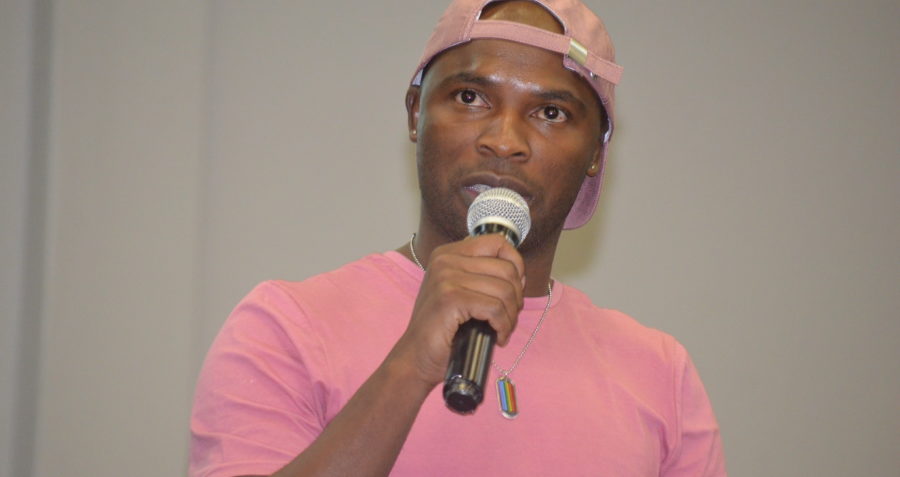How do we get the UHC we want?
 © Paleni Amulungu for ARASA
© Paleni Amulungu for ARASA
How can we keep HIV firmly on the UHC agenda and hold governments accountable for their promises on health for all?
Universal Health Coverage (UHC) is a social contract where people contribute to the welfare state according to their means and are able to access healthcare as part of a peaceful, fair, productive and tolerant society. Looking at the current global realities, access to healthcare is highly unequal – a characteristic of widening global inequalities. The global UHC commitments and national action to deliver them seek to address that.
However, marginalised people are often at risk of being excluded from UHC. They often face discrimination and structural barriers, such as needing to register a home address to be eligible for health services. For many marginalised people, such as sex workers or people who use drugs, this simply isn’t possible.
It is also critically important that the UHC movement in countries drives the decriminalisation of marginalised people so that they are able to access health services safely. How can we expect sex workers or people who use drugs to access services if they are being persecuted & criminalised?
That’s why it’s so important that the voices of these people are heard, including during technical and financing debates, and that they are able to shape what UHC will look like where they live.
Under pressure from international financial institutions, African governments are making plans to introduce many of the principles of UHC into their national health systems without increasing their health budgets or making any structural or political changes.
In Kenya, the government has launched its UHC pilots without a framework, targets, indicators or even a definition of the minimum package of services that citizens can expect when they walk in to a health centre. 80% of the funds were allocated to infrastructure and sophisticated equipment, while the working conditions of medical staff and stock of medicines remain in a dire state. Civil society organisations had limited involvement in developing the pilots, let alone young people or marginalised affected by HIV.
Defining the UHC we want
To ensure marginalised people, and adolescents and young people affected by HIV and AIDS are not left behind by UHC, AIDS and Rights Alliance for Southern Africa (ARASA) organised the workshop with fifty activists and specialists from across sub-Saharan Africa. The partners came together to strategise on how we can advocate together for the UHC we want. The workshop was organised in partnership with Aidsfonds, Frontline AIDS, Health Gap and UNAIDS; and with support from the Partnership to Inspire, Transform and Connect the HIV Response (PITCH).
Here are some of things we agreed to do
- It is critical to be involved from the start, define and cost the comprehensive package of services under UHC. We are working closely with the PEPFAR and Global Fund mechanisms in countries. We must now use our political capital in Global Fund Country Coordinating Mechanisms (CCMs) to hold governments accountable for progressing UHC.
- We must ensure communities are equal partners as they have a unique role to play in providing effective services and monitoring progress. There is robust evidence that community-led interventions are effective in providing services for marginalised people, including lesbian, gay, bisexual and transgender (LGBT) people, sex workers and people who use drugs. We must make sure they are part of the plan. We need social contracting mechanisms and funding for community-led and delivered services.
- We can make the UHC agenda more accessible to our communities by providing clear and simple information in plain language. This will help mobilise communities to get involved.
- We need to team up with others, outside the HIV community, who are advocating for inclusive UHC. We must make sure that any agenda around equality or social accountability takes into account not only the poor, but also those who are criminalised and marginalised in other ways, e.g. through stigma and criminalisation.
- We also need to continue advocating for decriminalisation of marginalised people and combatting social norms that foster stigma and discrimination.
Activists share their views about UHC
We, as civil society have the power to create political will. We have evidence – we need to use it.Aanu’ Rotimi, ROTIMI Head of Programs, Health Reform Foundation of Nigeria(HERFON)
A lot of international organisations have African Leaders: UNAIDS, WHO, UN secretariat general : we need to engage them more on UHC.Aanu’, HERFON, Nigeria
To me UHC is social justice. It is quality services, affordable to people, to improve the quality of life of everyone.Tadios Munyimani, GALZ, Zimbabwe
Our energy and resources have been depleted for too long in technocratic discussions without much result in the last 10 years. It is time to dream of social justice, it is time for community mobilisation and for social accountability.Asia Russell, Health Gap
Joining the call to action
As the result of the workshop, a call to action ‘Towards the Universal Health Coverage We Want’ has been developed. To join this call to action email – nyasha@arasa.info
Following the workshop, adolescents and young people have started to speak up about the UHC they want via the #READY4UHC campaign. The campaign’s goal is that young people are meaningfuly involved in the design and implementation of country UHC plans at every level. We encourage you to join this movement. More information is available at the campaign’s website.
UHC can potentially deliver life-saving and equitable care for millions of people. As governments develop their national plans, we must keep HIV firmly on the UHC agenda; and ensure marginalised people, adolescents and young people affected by HIV and AIDS have a seat at the table and hold governments accountable for their promises on health for all.
Tags
People who are marginalisedPITCHUniversal Health Coverage (UHC)


